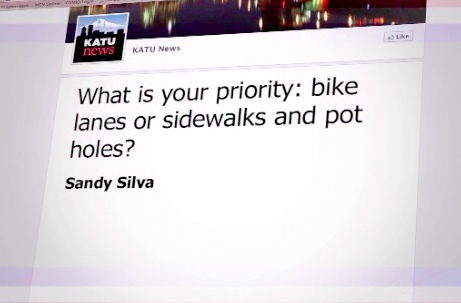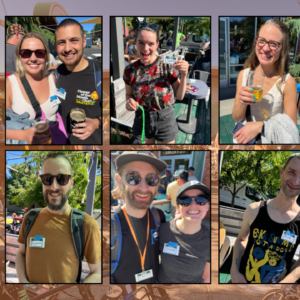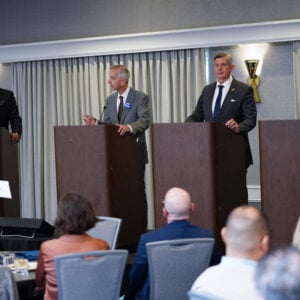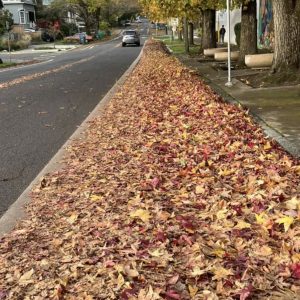KATU-TV (Portland’s ABC affiliate) and Willamette Week hosted a televised mayoral debate on Sunday night. It was a very good debate with questions taken from live audience members, online fans, and seasoned political reporters from both outlets. Then this happened…

You would think all three candidates could easily spot the false dichotomy in this question and use their answer to diffuse this divisive idea that is preventing our city from moving forward like it should. Unfortunately, that’s not exactly what happened.
Jefferson Smith was the first to answer and this question. And he nailed it. “I would say I think it’s a false choice that has been locking up our transportation politics for a while. Let me offer a different thought.” Smith then went into an explanation of the funding crisis and his idea for building a “senior-friendly” transportation system (that he first elaborated on at the Bike Walk Vote event last month).
But strangely, even with Smith paving the way before them, neither Charlie Hales or Eileen Brady dispelled the inherent problem with the question. To their credit though, they didn’t take the bait completely.
Here’s how Hales tackled it: “Under my leadership, the next city council will focus on basic services. And this is one of them.” (Whenever I hear it put that way, I feel like the person is inferring that bike lanes are not “basic services.”) Hales then went into how during his previous stint as City Commissioner he had half the budget of today’s council and yet, “repaved five times as many miles of streets.” Thankfully, Hales saved his answer when he said, “But as we do that [pave a lot of streets], we make the system better for everyone; for bicyclists, for drivers, for people that want to get safely across the street.”
Brady was up next. She repeated what she told me during our interview, that, “We need a balanced transportation system.” She also repeated what I feel is not exactly a true statement. “It is inconceivable to me,” she said, “that our transportation bureau has just announced that we’re not going to pave and repave many of the major arterials for the next five years.” PBOT’s budget zeroed out only one type of paving project (where they completely rebuild a road); but they are still funding paving to the tune of around $10 million this coming year and they’ll repave about 15-20 miles of roads. Brady also shared her idea to create a “sustainable maintenance fund” within PBOT which, she says, would make the “balanced” transportation system she envisions possible. “I’m a bike rider, I’m also a car driver, I also love light rail,” she said.
Watch the question and their answers below…
I know many of you are still undecided when it comes to picking a mayor. Did this KATU clip help you make a decision?







Thanks for reading.
BikePortland has served this community with independent community journalism since 2005. We rely on subscriptions from readers like you to survive. Your financial support is vital in keeping this valuable resource alive and well.
Please subscribe today to strengthen and expand our work.
I was at my neighbor’s house party for Jefferson Smith last night and he mentioned this exchange, and the deplorable framing of the issue. I was impressed with his utterances before meeting him in person, and found him extremely articulate on every question that came up.
I met/ listened to all three candidates at a debate at Concordia University last month. I was definitely impressed only with Jefferson Smith.
Sidewalks and pot, for sure. Oh wait.
How about education so people know “pothole” is all one word?
http://www.oregonvotes.org/
BikePortland readers in Oregon.
Today is the last day to register to vote in Oregon for the upcoming election. Yes we can!
I’m actually really loving this election.
I didn’t live in Portland when Sam Adams was voted in and up until now I’ve always been registered to vote in small towns. Not to say the choice of mayor in a small town isn’t important, but in many cases it was really only one person who even wanted the job making the whole “voting” thing more of a formality.
So all that said, this may be the first time ever in my adult life I’m not just voting for who I think is the lesser of two evils (i.e. the who Dem vs. Rep thing) on a state or national level. It feels…well…pretty good!
And this is the problem with the voting public. Dismissing your local representatives as not as important as state and federal level.
Your mayor and local council have a greater impact on your daily life over any other level of government: water rates, property tax, school funding, garbage collection, roads, sewers, fire and police services, and on and on and on.
Big or small town paying attention to local politics is extremely important, not just at election time as seems to be the norm for most voters.
And how exactly did Andrew dismiss local politics as being less important than state pr federal?
The following statements
“Not to say the choice of mayor in a small town isn’t important, but in many cases it was really only one person who even wanted the job making the whole “voting” thing more of a formality.”
“this may be the first time ever in my adult life I’m not just voting for who I think is the lesser of two evils (i.e. the who Dem vs. Rep thing) on a state or national level.”
Both indicate that local voting for him was throw away until this particular election.
Neither indicate that it’s throwing a vote away – the only implication was that local politics aren’t as important as state and national politics. Depending on one’s idea of “important”, that’s a valid assertion. When talking international trade or national defense, obviously local politics are far less important. I agree with you that in many ways, local politics are far more impacting and relevant to the average person, but there are ways to make that point without tearing down another contributor.
I made a general comment on how people vote in local political races based on the original comment posted. I was then asked to point out how I came to that conclusion. I posted the relevant sections of the original post from which I drew my conclusion. No one was tearing anyone down. If you don’t wish to have a critical eye turned towards you, then maybe you shouldn’t post to an open forum.
I think the sidewalks would prefer to be with bike paths rather than with the pot holes.
They just can’t resist the “us versus them” thing, can they?
Sandy Silva must be a true piece of work. False dichotomies are, and will always be, false.
On potholes, road wear, poorly placed catenary poles and overall road system rundown:
America’s biggest economic multiplier in this last century has been our vast high quality road system that is free for all of the public to use.
On the theory that “If X = ‘good’ Then X*2 = ‘double-good’ “. Early on this held true; even in recent decades this looks true if one only looks at the short term/local time scale.
What most long range planners noticed a few decades ago is that there is a saturation point where new roads and capacity give diminishing returns. Recently some urban planners have become aware of the suburban Ponzi scheme whereby infrastructure financing for suburban expansion is planned to payed for by full urbanization of the new zone. Consistently these new suburbs are saddled with infrastructure debt and maintenance costs the tax bas can ill afford.
So here is the hole WE as a nation have ALL dug for ourselves: whilst chasing the siren song of a quick buck we have built a road system we cannot afford to maintain with the status quo; from the federal level all the way down to small country towns.
Do we raise fuel taxes?
Do we instate weight/mile taxes uniformly for ALL users?
Do we raise the cost of heavier vehicle ownership such that only the rich can afford to drive thus decreasing road wear?
Do we provide economic incentives to road users that put less wear and demand on our shared road system?
Our economy NEEDS this vast road system to survive much in the same way a forge needs a fast supply of fresh air. Unfortunately our economic forge is being stoked by a road system that is getting its air from the chimney. As the fire is starved it is increasing difficult to get it going again unless some paradigm is drastically changed.
Well said.
The currently failing economic system may NEED the currently faltering road system. Necessity WILL mother invention once we stop trying to bailout ponzi schemes.
“Recently some urban planners have become aware of the suburban Ponzi scheme whereby infrastructure financing for suburban expansion is planned to payed for by full urbanization of the new zone. Consistently these new suburbs are saddled with infrastructure debt and maintenance costs the tax bas can ill afford.”
This was actually a hot topic about 20 years ago.
Yes, much that is learned is forgotten by accident or by force. In this case I suspect that people that spoke that way in the past suffered the fate of Yehuda Moon.
Andrew K,
I’ve been thinking the same thing a lot. As voters, we’re pretty lucky this time around to have as front runners three smart, articulate, hard-working candidates who all share a passion for making Portland a better place and who all have a real resume’ of sleeve-rolling, get-it-done activism. Unlike in the past, I’m not afraid of what will happen if my candidate doesn’t win. Not to say I don’t have a strong preference for JS…
Thanks for embedding the clip. I enjoyed watching the look on Hales’ face as Brady answered the question.
Eileen Brady is her own biggest fan.
Sylvia is asking this: Who do you really care about: Bicyclists? Or (normal) people who walk and drive?
Jefferson Smith FTW!
Based on several interviews and articles I’ve read about the candidates, I’m mostly choosing between Hales and Smith. Brady seems a little one-sided. I’m still keeping an open mind though. No need to commit too early.
She talks a good game, but like Sam will not be able to produce to the dollars to meet the vision.
Pot holes OR bike lanes? Can’t we have BOTH? ( btw, I regard potholes as organic speed bumps)
Jefferson “paving the way…” HA!